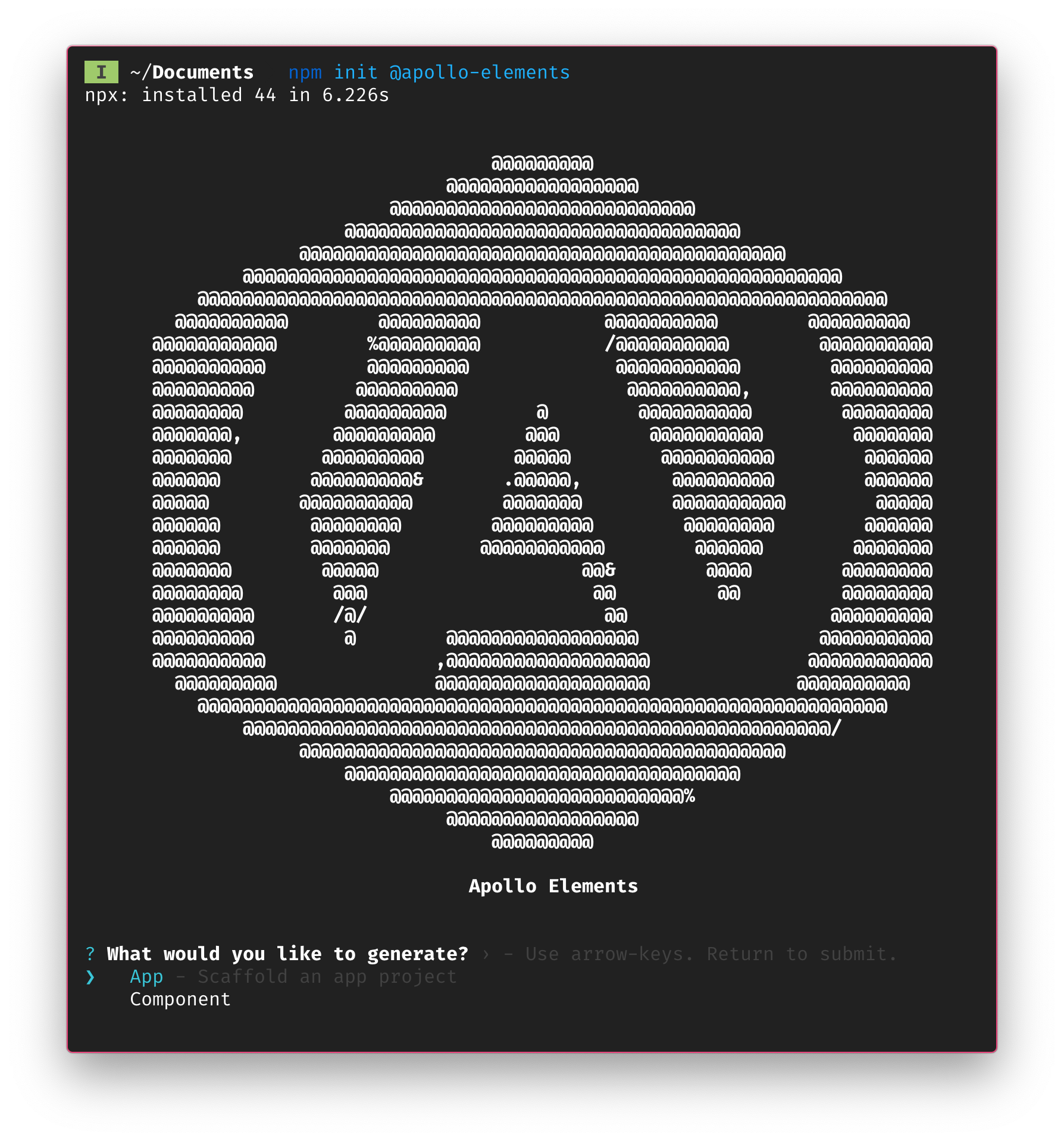@apollo-elements/create
🔎 Read the Full API Docs🔎
To quickly get started with apollo-elements, generate a skeleton app with this command
npm init @apollo-elementsWhich will prompt you to generate a full app, or a component thereof.
App Generator
npm init @apollo-elements -- appGenerate an Apollo Elements Skeleton App
Example
npm init @apollo-elements -- \
app \
--pkg-manager yarn \
--uri '/graphql' \
--install \
--start \
--overwriteOptions
| Flag | Description | type | default |
|---|---|---|---|
--help |
Show help | boolean | |
--version |
Show version number | boolean | |
--pkg-manager |
Preferred package manager |
npm or yarn
|
npm |
--uri, -u
|
URI to your GraphQL endpoint | string | |
--overwrite |
Overwrite existing files | boolean | |
--package-defaults |
Use default package.json fields (e.g. author, license) | boolean | |
--codegen |
Run codegen after scaffolding files | boolean | true |
--install, -i
|
Automatically install dependencies | boolean | |
--start, -s
|
Launch the dev server after scaffolding | boolean |
🔋 Batteries Included
The generated app comes with plenty of bells-and-whistles:
- TypeScript
- Linting with eslint and an opinionated ruleset
- Buildless development workflow with
@web/dev-server - Minified production bundle
- A basic Apollo Client instance
- Simple, unopinionated SPA routing
- Code-generated TypeScript typings for GraphQL documents
import MyQuery from './My.query.graphql'import styles from './my-element.css'
🛎 Scripts
These npm scripts help you get your work done in style:
npm start
yarn startruns the code generator and the development server in watch mode
npm run build
yarn buildbundles the app into /build. The build will bundle and minify your javascript, and minify your HTML. Just upload to your static file host and you're good.
npm run lint
yarn lintLint your app with an opinionated set of rules for JavaScript and TypeScript
npm test
yarn testThe generator currently doesn't offer strong opinions on testing your UI components, so npm test currently exist with an error code. For unit testing business logic (i.e. typePolicies), we recommend @web/test-runner
Component Generator
npm init @apollo-elements -- componentGenerate an Apollo Element
Example
npm init @apollo-elements -- \
component \
--type mutation \
--name x-user-profile \
--subdir user \
--schema-path '#schema' \
--shared-css-path '#components/shared.css' \
--variables '$input: UpdateProfileInput!' \
--fields 'updateProfile(input: $input) { id }' \
--no-codegen
--overwriteOptions
| Flag | Description | type | default |
|---|---|---|---|
--help |
Show help | boolean | |
--version |
Show version number | boolean | |
--pkg-manager |
Preferred package manager |
npm or yarn
|
npm |
--type, -t
|
Element type |
query, mutation, or subscription
|
query |
--name, -n
|
Custom element tag name | string | |
--subdir, -d
|
Optional subdir under src/components | string | |
--overwrite |
Overwrite existing files | boolean | false |
--codegen |
Run codegen after scaffolding files | boolean | true |
--schema-path |
Optional custom path to schema types file | string | |
--shared-css-path |
Optional custom path to shared component styles file | string | |
--variables |
Optional custom variables e.g. input: $UpdateUserInput
|
string | |
--fields |
Optional custom fields e.g. id name picture { alt url }
|
string |




